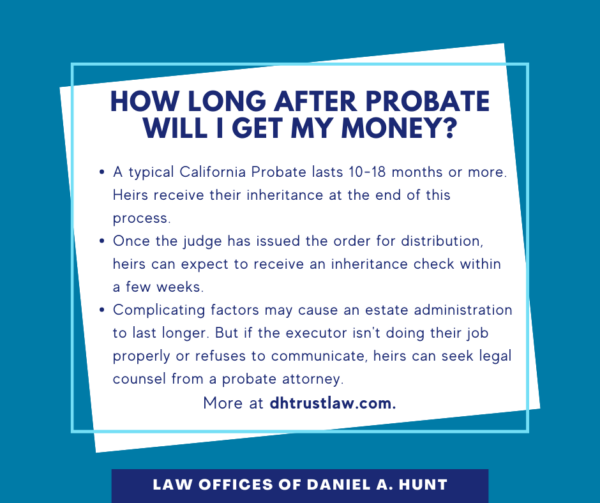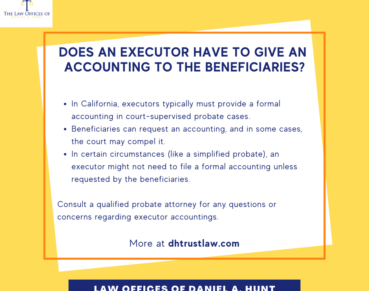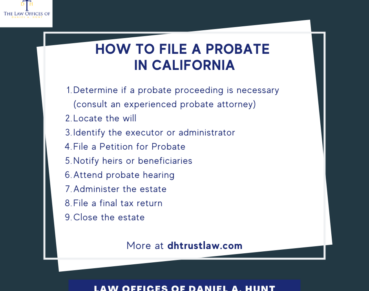How Long After Probate Will I Get My Money?

In California, when a loved one dies without an estate plan in place, their estate will need to pass through the probate court before heirs can receive their inheritance. Many heirs may wonder: How long after probate will I get my money? The answer varies depending on many factors, but here’s an overview of what to expect.
How Long Does Probate Take?
Wondering how long a California Probate takes? While the timeline for a typical California Probate varies based on the county, most follow a similar pattern. Here’s an example of a typical California probate timeline.
- Estate Executor or Personal Representative Files a Probate Petition. First, the person administering the estate must file a Probate Petition and a document called “Duties and Liabilities of Personal Representative” with the Probate Court in the county where the decedent was a resident. This typically may take up to a few weeks.
- Publish and Mail Notices. Immediately after filing a petition, the personal representative must publish a notice of the initial court hearing date. This notice will appear in a newspaper of generation circulation in the city where the decedent lived. If the decedent created a will, the personal representative must also mail a notice to all heirs and any beneficiaries named in that document.
- Initial court hearing. The personal representative and their probate attorney will attend the initial court hearing at the courthouse where the petition was filed. At the hearing, the judge will sign an “Order for Probate” and appoint them as the estate’s personal representative. When will the hearing take place? The time frame depends on the county. For example, in 2023 in Sacramento County, this hearing would take place 16-20 weeks after filing the Probate Petition.
- Bond Issued. If the judge orders the personal representative to obtain a bond, they’ll need to secure one. This is basically insurance to protect the estate against the risk of mismanagement.
- Court issues “Letters of Administration”. This document authorizes the personal representative to act on behalf of the estate. If their bond was in place at the hearing or no bond was required, they should receive this document at the initial hearing. Once they receive Letters of Administration, they will be able to show them to any financial institutions to begin the work of estate administration.
- Collect and inventory assets. After taking an inventory of all estate assets, the personal representative should begin to liquidate personal property (including bank or investment accounts), meaning convert them into cash that can later be distributed to the heirs/beneficiaries.
- Send “Notice to Creditors” to any known creditors and potentially pay debts. After that, creditors have 4 months to file any claims with the court. If they have hired a probate attorney, they can help respond to any existing creditor claims. This can get tricky, as not all claims have the same priority under the Probate Code.
- Sell real property. If the court granted the personal representative “full authority”, they may sell real property assets if necessary. If the court only granted them “Limited Authority,” then the court must confirm any sale of real estate.
- File “Inventory & Appraisal” (I&A) with the court. The personal representative will have the probate referee complete an appraisal of the estate within 90 days of receiving letters.
- If the decedent owned real property, the personal representative must file a “Change in Ownership Statement – Death of Real Property Owner” with the County Recorder. This form lets the county know that the owner of a piece of real estate has died and informs them of the new owner. This happens in connection with the Inventory & Appraisal.
- Pay final income taxes. This happens 6-12 months after filing the petition. A CPA can help file a short-year income tax return if appropriate, so they don’t have to wait out the year to close the estate.
- File a “Petition for Final Distribution” with the court. This indicates that all debts have been handled, all required steps have been taken, and the personal representative is ready to close the estate and distribute the assets. This can only happen after filing the creditor claim period has ended and the estate is in a position to distribute the assets. If a year has passed from the opening of the probate matter and the estate is not ready to distribute, then the personal representative must file a report and account with the court explaining the status of the administration.
- Final court hearing. The personal representative and their probate attorney appear in court. If all goes well, the judge will give them a signed order allowing them to distribute assets to the heirs. This happens 10 to 18 months after filing the initial petition.
The total length of each probate varies based on many variables, including how backlogged the court system is in that particular county at the time. But overall, you can expect to spend at least 10 to 18 months in probate, from filing the original petition to distributing estate assets.
When Do Heirs Receive Their Inheritance?
Heirs receive their money after all outstanding debts and taxes have been paid, and the judge has issued a signed order granting the personal representative permission to distribute estate assets. In other words, heirs receive their inheritance at the end of the probate proceeding. Generally, this is at least 10-18 months after the probate petition is initially filed with the court.
Once the judge has issued the order for distribution, estate heirs can expect to receive an inheritance check within a few weeks.
Can I Get My Money Faster?
Because the probate process is so time-consuming, sometimes heirs ask if there is a way to get their money faster. Some companies offer a “probate cash advance” which allows estate heirs to receive their inheritance immediately rather than waiting until the probate concludes. Most companies charge a flat rate for the cash advance ranging from 10% to 50% of the cash value.
If there is an urgent need for the inheritance funds, a probate cash advance may be an option to consider. But if there is no urgent economic need, heirs who wait will maximize their inheritance.
What To Do If Probate is Taking Too Long
As an estate heir or beneficiary, you may wonder what you can do if the probate lasts far beyond the expected time frame. First, understand that some situations can complicate a probate matter and cause it to last much longer than 18 months, such as:
- Will contests
- Real estate sales
- Estate litigation
- Or any other complicating factors
However, if you suspect that the probate is dragging on because the estate personal representative isn’t doing their job, or if they are refusing to communicate with you about the status of the probate proceeding, that’s a different matter. In this scenario, seek the counsel of an experienced probate litigation attorney who can help counsel you on the best path to move the probate toward a conclusion.
If you have any questions about probate or receiving an inheritance, feel free to contact our law firm.
Law Offices of Daniel A. Hunt
The Law Offices of Daniel A. Hunt is a California law firm specializing in Estate Planning; Trust Administration & Litigation; Probate; and Conservatorships. We've helped over 10,000 clients find peace of mind. We serve clients throughout the greater Sacramento region and the state of California.




